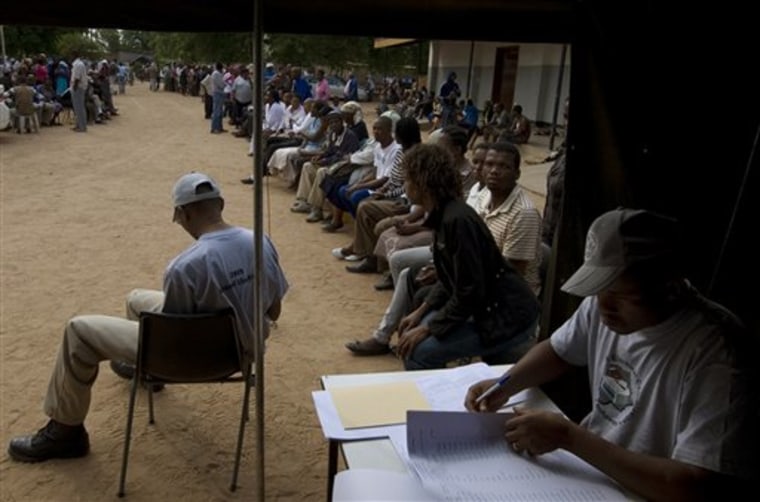Botswana held its 10th free and peaceful election Friday, an event sharply in contrast to political struggles and violence elsewhere in Africa.
Botswana's peaceful election is predicted to be a slam dunk for the longtime ruling party, even though the country faces myriad challenges of the being the world's largest diamond-producing country while struggling with a global recession, widespread poverty and one of the continent's highest AIDS rates.
The country's opposition, which is divided and weak, calls ruling party front-runner Seretse Ian Khama a divisive figure whose military background did not prepare him to lead a democracy. He dismisses charges he has tried to suppress dissent.
Some analysts say 40-plus years of single-party rule — since independence from Britain in 1966 — isn't full democracy.
None of that seemed to dampen the spirits of Gasenna Mohuptsiwa, who said she woke up at 4 a.m. — two and a half hours before polls opened — to get to her northern Gaborone voting station. She said she first voted in the 1970s, and was happy with the way the country has been run since independence. But she wouldn't say for whom she was voting.
"I'm happy that I'm able to vote for my future and my country," she said.
'Trying to make things better'
Researchers from the Mo Ibrahim Index of African Governance, which tracks development on the continent, said that entrenched belief in democracy and citizen participation is one of the things that put the country of 1.8 million people at number four in their index this year.
"There are lots of things wrong in every country," said Hania Farhan, director of research for this year's index. "They have lots of very difficult things and conditions in Botswana. But the point is, the elections are free, it's fairly well run and they are trying to make things better.
"It's all about enlightened leadership," she said. "Right from the beginning after independence they have had peaceful, relatively democratic transitions and relatively enlightened leadership. And in my belief, good governance is the basis for development."
Election officials in Gaborone, the capital, said they had seen no problems Friday.
But Africa analyst Gus Selassie said Botswana's single-party rule was worrisome.
"I think the fact that it's only been governed by one party in its entire democratic history to me, it's not healthy, in my view," said Selassie, who works for London-based IHS Global Insight. "You have one ruling party and basically people who have connections within that party tend to do well .... That stability factor goes down well with outsiders, but I'm not sure how the locals feel about their options."
Opposition parliamentarian Akanyang Magama, a member of parliament from the Botswana Front, said the country's recent economic struggles have inspired a record number of 18-to 29-year-olds have registered to vote — he hopes, for his party.
"I think that these people want change because they are the hardest hit by unemployment," he said.
According to the Independent Electoral Commission, a record 723,617 people have registered to vote — 243,833 of them between 18 and 29.
The Botswana Democratic Party won 44 of 57 seats in the last elections held in 2004, with the remaining 13 seats split between the Botswana National Front and the Botswana Congress Party.
Botswana, one of Africa's most politically and economically stable countries, is the size of Texas and sparsely populated.
More on: Africa
